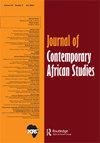联合国维和行动和加纳国内警务中警察表现的变化
IF 0.8
Q2 AREA STUDIES
引用次数: 5
摘要
加纳警察部门经常因表现不佳和无法有效应对不断上升的犯罪率而受到加纳公众的批评。媒体报道和学术研究证实了这些批评,列举了警察暴行、腐败、疏忽、无能和串通犯罪的事例。然而,除了少数例外,这些警察在联合国维持和平行动中因其专业精神、杰出表现和对恢复和平与法治的贡献而受到广泛赞扬。这就提出了一个问题,即为什么警察在国内的表现与在维持和平环境中的表现不同。本文分析了支撑国内和国际警察绩效感知变化的因素。基于对相关利益相关者进行的深入访谈,并将集合理论应用于所收集的经验证据,本文认为,绩效的感知变化与警察人员的技术能力和知识无关。相反,这种差异可以用以下因素来解释:殖民遗产对警察的影响;特派团和加纳的不同任务/任务;影响警务工作的独特社会文化和政治动态;管理国内和国际警务的不同法律框架和原则;可用的人力和后勤资源以及国内警务资金有限;以及处理违纪和腐败的不同方法。本文章由计算机程序翻译,如有差异,请以英文原文为准。
Variations in Police Performance in United Nations Peacekeeping Operations and Domestic Policing in Ghana
The Ghana Police Service is constantly criticised by the Ghanaian public for poor performance and an inability to deal effectively with rising crime rates. Media reports and scholarly research have corroborated these criticisms, citing instances of police brutality, corruption, negligence, ineffectiveness and complicity in crimes. However, with few exceptions, the same police are widely applauded in United Nations peacekeeping operations for their professionalism, outstanding performance, and contributions to restoring peace and the rule of law. This raises the question of why the police’s performance at home differs from its performance in peacekeeping contexts. This article analyses the factors that underpin the perceived variations in police performance at home and internationally. Based on in-depth interviews conducted with relevant stakeholders and the application of assemblage theory to the empirical evidence gathered, it argues that perceived variations in performance have nothing to do with the technical competencies and knowledge of police personnel. Rather, this discrepancy can be explained by factors including: the effects of the colonial legacy on the police; different mandates/tasks in mission and in Ghana; distinct socio-cultural and political dynamics that influence policing; different legal frameworks and principles that govern domestic and international policing; limited availability of human and logistical resources and funding for domestic policing; and different methods for dealing with indiscipline and corruption.
求助全文
通过发布文献求助,成功后即可免费获取论文全文。
去求助
来源期刊

Journal of Contemporary African Studies
AREA STUDIES-
CiteScore
2.20
自引率
0.00%
发文量
18
期刊介绍:
Journal of Contemporary African Studies (JCAS) is an interdisciplinary journal seeking to promote an African-centred scholarly understanding of societies on the continent and their location within the global political economy. Its scope extends across a wide range of social science and humanities disciplines with topics covered including, but not limited to, culture, development, education, environmental questions, gender, government, labour, land, leadership, political economy politics, social movements, sociology of knowledge and welfare. JCAS welcomes contributions reviewing general trends in the academic literature with a specific focus on debates and developments in Africa as part of a broader aim of contributing towards the development of viable communities of African scholarship. The journal publishes original research articles, book reviews, notes from the field, debates, research reports and occasional review essays. It also publishes special issues and welcomes proposals for new topics. JCAS is published four times a year, in January, April, July and October.
 求助内容:
求助内容: 应助结果提醒方式:
应助结果提醒方式:


